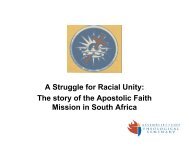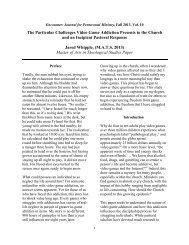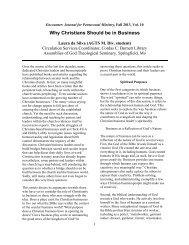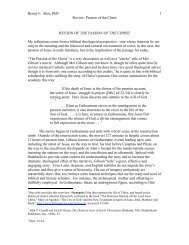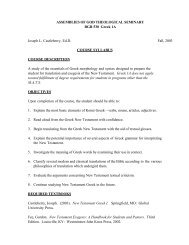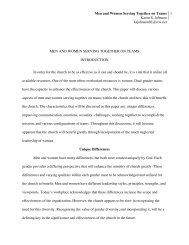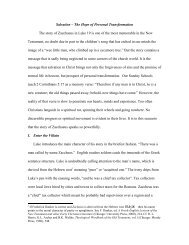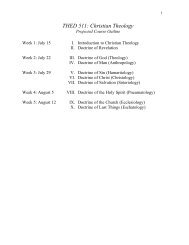Encounter: Journal for Pentecostal Ministry - Assemblies of God ...
Encounter: Journal for Pentecostal Ministry - Assemblies of God ...
Encounter: Journal for Pentecostal Ministry - Assemblies of God ...
You also want an ePaper? Increase the reach of your titles
YUMPU automatically turns print PDFs into web optimized ePapers that Google loves.
Wolterstorff , Nicholas. “Foreword.” In Evangelicals and Empire: Christian Alternatives to the<br />
Political Status Quo, edited by Bruce Ellis Benson and Peter Goodwin Heltzel, 7-10. Grand<br />
Rapids, MI: Brazos Press, 2008.<br />
Yoder, John Howard. The Politics <strong>of</strong> Jesus. 2nd ed. Grand Rapids, MI: William B. Eerdmans<br />
Publishing Company, 1994.<br />
Yong, Amos, and Samuel Zalanga. “What Empire, Which Multitude? <strong>Pentecostal</strong>ism and Social<br />
Liberation in North America and Sub-Saharan Africa.” In Evangelicals and Empire, edited<br />
by Bruce Ellis Benson, and Peter Goodwin Heltzel, 237-51. Grand Rapids, MI: Brazos<br />
Press, 2008.<br />
Oregon, 2009.<br />
1 This paper was presented at the 38th annual meeting <strong>of</strong> the Society <strong>for</strong> <strong>Pentecostal</strong> Studies in Eugene,<br />
2 Two examples, <strong>of</strong> which there are undoubtedly many, are Kevin Phillips‟ “Too Many Preachers,” in<br />
American Theocracy: The Peril and Politics <strong>of</strong> Radical Religion, Oil, and Borrowed Money in the 21st Century (New<br />
York, NY: Viking, 2006), 99-264; as well as Janet E. Grant, though she only mentions the prospects <strong>of</strong> the Religious<br />
Right‟s political agenda as a repugnant alternative to other proposals. See Jane E. Grant, The New American Social<br />
Compact: Rights and Responsibilities in the Twenty-First Century (Lanham, MD: Lexington Books, 2008).<br />
Niebuhr commented on the Christian‟s temptation in light <strong>of</strong> the recognition <strong>of</strong> such a sinful world to<br />
disavowing his or her own responsibility to contribute to a “tolerable justice” in the world‟s affairs. He noted, “A<br />
Christian pessimism which becomes a temptation to irresponsibility toward all those social tasks which constantly<br />
confront the life <strong>of</strong> men and nations—tasks <strong>of</strong> ordering the productive labor <strong>of</strong> men, <strong>of</strong> adjudicating their conflicts, <strong>of</strong><br />
arbitrating their divergent desires, <strong>of</strong> raising the level <strong>of</strong> their social imagination and increasing the range <strong>of</strong> their<br />
social sympathies—such a pessimism cannot speak redemptively to a world constantly threatened by anarchy and<br />
suffering from injustice. The Christian gospel which transcends all particular and contemporary social situations can<br />
be preached with power only by a Church which bears its share <strong>of</strong> the burdens <strong>of</strong> immediate situations in which men<br />
are involved, burdens <strong>of</strong> establishing peace, <strong>of</strong> achieving justice, and <strong>of</strong> perfecting justice in the spirit <strong>of</strong> love. Thus is<br />
the Kingdom <strong>of</strong> <strong>God</strong> which is not <strong>of</strong> this world made relevant to every problem <strong>of</strong> the world;” Reinhold Niebuhr,<br />
Reinhold Niebuhr on Politics: His Political Philosophy and Its Application to Our Age as Expressed in His Writings,<br />
ed. Harry R. Davis and Robert C. Good (New York, NY: Charles Scribner‟s Sons, 1960), 153-4.<br />
Joseph Ratzinger (Pope Benedict XVI) warns that in Christianity‟s claim to the ultimate truth in the midst <strong>of</strong><br />
a pluralistic democracy Christians <strong>of</strong>ten comes across as politically intolerant, and this must be dealt with carefully.<br />
Conversely, Ratzinger supports a dual system <strong>of</strong> government where the Church has no authoritative power over the<br />
state per se; its impact rather comes through the Church‟s influence by its possession <strong>of</strong> the transcendent ethic that is<br />
necessary <strong>for</strong> the rational grounding <strong>of</strong> the ethics that the state relies upon to en<strong>for</strong>ce its policies. It is the Christian<br />
faith that substantiates ethics and, in this sense, reason that is closed in on itself does not remain reasonable, while the<br />
state that attempts perfection becomes tyrannical. Joseph Ratzinger, Church, Ecumenism, and Politics: New<br />
Endeavors in Ecclesiology, 1987, trans. Michael J. Miller et al. (San Francisco, CA: Ignatius Press, 2008), 143-255.<br />
3 Tony Campolo, Red Letter Christians: A Citizen’s Guide to Faith & Politics (Ventura, CA: Regal, 2008).<br />
4 Either in the sense <strong>of</strong> the old Anabaptist isolationism, or simply remaining non-committal in most political<br />
scenarios except those issues <strong>of</strong> utmost importance—these are usually rather arbitrary judgments.<br />
5 It is further noted that, “One‟s hope is that this process may encourage us to move beyond „political<br />
theologies‟ to „theological politics‟—a theologically driven approach to the state rather than a politically driven<br />
approach to <strong>God</strong>. This would involve an approach which interprets our responsibilities to the state and within the state<br />
in the light <strong>of</strong> <strong>God</strong>‟s inclusive, recreative and healing purposes held <strong>for</strong>th in <strong>God</strong>‟s Word <strong>of</strong> grace to humanity. Such<br />
an approach to society, to culture, to the state and to the ecosystem would be both more radical and more liberating—<br />
theologically and politically—than so much that has sought in recent times to lay claim to these attributes” [author‟s



